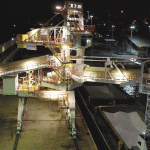Print & Label
RFID label, Thermal Transfer Label and Barcode Printers, Star Ticket Printers, barcode generation software, POS Printers and Networked Thermal Printers, including mobile labelling technology and mobile printer applications.Print & Label
Businesses face a paradox: they must abide by stringent regulations in order to stay in business, yet those same regulations can present challenges to operating efficiently. Regulations affect many facets of the supply chain, including your labeling. If a carton or pallet label doesn’t comply with regulations, your package won’t make it to market. That costs you […]

Businesses face a paradox: they must abide by stringent regulations in order to stay in business, yet those same regulations can present challenges to operating efficiently. Regulations affect many facets of the supply chain, including your labeling. If a carton or pallet label doesn’t comply with regulations, your package won’t make it to market. That costs you money and time, as well as reputational damage.
How can you conquer regulatory labeling challenges? The right Enterprise Labeling Solution allows you to navigate industry issues, emerging markets and ever-evolving regulatory environments.
What Are Some Industry Issues Facing Organizations?
Certain industries are more heavily regulated than others. For instance, the chemical production industry falls into that category. The Globally Harmonized System of Classification and Labeling of Chemicals (GHS for short) specifies what information must be displayed on labels and how it must be displayed. If labels don’t meet those standards, your chemicals may be rerouted, confiscated or destroyed, depending on the specific region.
Another strictly regulated field is the medical device industry. The FDA has its Unique Device Identification (UDI) system, and the EU just put its Medical Device Regulations (MDR) and In Vitro Diagnostic Regulations (IVDR) into effect. Those laws create an added compliance burden for manufacturers.
How does an Enterprise Labeling Solution help you navigate these issues? It standardizes and centralizes enterprise labeling to ensure accuracy, consistency, and above all, regulatory compliance. Cloud-based capabilities make it easy to deploy and extend labeling across your organization, so you can eliminate disparate, disconnected labeling systems.
The Eaton Corporation, a multinational power management company, implemented Loftware’s Enterprise Labeling Solution in part to meet regulatory requirements. The company has noted that Loftware helps them avoid fines because it can now comply with labeling requirements.
Emerging Markets and Ever-Evolving Regulatory Environments
In addition to dealing with regulatory burdens within the U.S., companies that wish to enter emerging markets must be aware of what’s happening there as well. Places such as Brazil, China, and India represent enormous economic opportunities. At the same time, laws in those countries continue to evolve – what was acceptable last year might not be this year.
Those laws affect labeling requirements, too. For example, medical devices in Russia must have labeling in the local language along with specially registered markings. How do you overcome these challenges while staying competitive and expanding into new markets?
An Enterprise Labeling Solution clearly helps. This software integrates directly with your sources of truth (which could include a compliance regulation database). You no longer need to rely on spreadsheets or the “file drop” approach, which is highly problematic in the face of ever-changing regulations.
In addition, the right labeling solution provides support for multiple languages right out of the box. You don’t have to worry about creating labels in Portuguese for Brazil – the tools are right at your fingertips. It’s also easy to apply business logic (i.e., if this, then that), automating label variations to ensure accuracy and reduce the number of templates without involving IT.
McCormick & Company, the spice, herb, and flavoring manufacturer, believes that implementing Loftware has enabled it to stay agile in an uncertain regulatory climate. “With Loftware, we are extremely responsive to regulatory, customer and internal demand for new/updated labeling,” said Tim Cukr, IT professional at McCormick & Company.
Woman worker wearing a hard had holding a labeling gun.
Regulatory Non-Compliance
Although regulations create challenges for companies, non-compliance causes even bigger problems. Health and safety issues could arise due to mislabeling, which could be tragic as well as costly for firms. Injuries or deaths are tragic in their own right, but they could lead also to expensive and time-consuming product recalls. You might face fines or other penalties, and your reputation will be ruined.
That’s where an Enterprise Labeling Solution comes in. It gives regulatory teams greater control over the labeling process. With homegrown labeling systems, you need extensive IT involvement. That’s cumbersome, time-consuming, and highly inefficient.
The right Enterprise Labeling Solution allows you to apply whatever information or symbols that are necessary to stay compliant with regulations without the involvement of the IT department. You save time while ensuring consistency, accuracy and regulatory compliance.
CommScope, Inc., a multi-national network infrastructure provider, implemented Loftware in part to aid regulatory compliance. Gladys Lira, an engineer for the company, noted that Loftware helps CommScope, Inc. maintain industry standards as well as ensure regulatory compliance.
Supply Chain Disruption
Beyond the health and safety issues, recalls and fines, non-compliance has another negative effect: it can severely disrupt the supply chain. The disruption can occur at any point: from production to distribution.
Some countries have the policy of seizing and destroying export shipments that are mislabeled. This is an expense as well as an embarrassment for manufacturers – their goods don’t make it into that market, leaving them with unhappy customers.
Every company wants to avoid supply chain disruption, but they struggle with how to do so efficiently and effectively. An Enterprise Labeling Solution is part of the answer. One of the ways in which it prevents supply chain disruption is by closing the loop of the workflow and the approval process.
Many people are involved in the labeling process, so it’s vital that a systematic workflow process is used in order to ensure consistent and accurate labels. Generating labels on the warehouse floor with disparate labeling systems leads to errors, mislabeling and chaos. When you automate the workflow and streamline the approval of label review, you get the right people involved and the process goes much faster.
Accenture, the global consulting giant, uses Loftware to help mitigate supply chain disruptions. Atul Mantry, IT systems analyst at Accenture, noted that the firm has saved money as a result of eliminating such breakdowns.
Regulatory compliance doesn’t have to be a daunting challenge. The right Enterprise Labeling Solution enables you to operate at the speed of business while meeting your evolving requirements. To learn more, download our report: Regulatory Labeling Guide: 6 Best Practices to Sustain Compliance.










